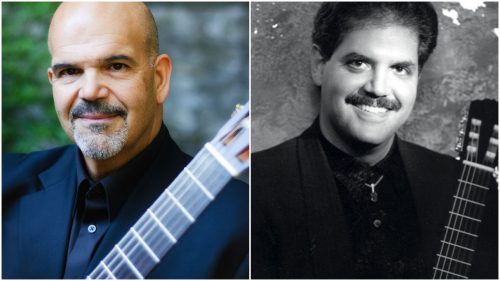Nicholas Goluses and Ricardo Cobo, faculty for the 2017 Eastman International Guitar Masterclass
by Andrea Schuler, Summer@Eastman Program Coordinator
Guitarists Nicholas Goluses and Ricardo Cobo have known each other for decades: they met in New York City in 1987, at the Music Teachers National Association Wurlitzer Competition finals (Goluses was the guitar judge; Cobo won the competition). They became fast friends and have kept in touch throughout their careers; Cobo is now Director of Classical Guitar Studies at the University of Nevada Las Vegas, and Goluses is Eastman’s Professor of Guitar and Co-Chair of the String Department. They continue to seek out opportunities to work together; this summer, they will team up in Rochester to present the Eastman International Guitar Masterclass (July 24-29). I was delighted to interview them both for this story.
Nick, what can students expect this summer? Talk a bit about your plans for the week.
NG: The class is designed for collegiate/conservatory guitarists: “rising stars” who intend to pursue music careers. It will be a great opportunity for players to focus on practice, whether they are preparing for competitions or concentrating on basics like improving facility, style and sound.
Students are encouraged to bring repertoire in various stages of development: pieces “under construction” (newer works that students are still learning, working out fingerings or general organization) as well as works that have already been performed are both welcome! There is always something new to learn, no matter how much time students have spent with a piece.
We will also explore instrument setup, sound production and ways that sound can be improved–Eastman is known as a school that celebrates quality of sound across all instruments, and the guitar studio is no exception. I have always loved Ricardo’s sound; I’m sure he’ll have a lot to say about this topic!
There will be concerts, too: Ricardo and I will each perform a solo recital (we may play some duets). Students will perform in a Participant Concert at the end of the week.
Tell us about Ricardo Cobo, this summer’s special guest instructor.
NG: Ricardo is an extremely generous, giving teacher and an incredible artist! He is originally from Colombia and has become especially well-known for his interpretations of Latin American music. I’m so glad he’ll be joining us this summer.
What do you enjoy most about summer masterclasses and workshops?
NG: I love summer workshops because they foster such a sense of camaraderie. Students come together from different places and bring lots of ideas with them, so we can explore a variety of concepts (rather than focusing on one idea or “school” of technique). Also, practicing in warm weather is the best!
What are your goals for the five-day workshop? What do you hope students will learn from the experience?
NG: I hope that students will learn to practice better, and that we can teach ways to incorporate relaxation and efficiency into the students’ practice and playing.
We also plan to talk about how students might create and launch a professional career. Guitarists have always had to make their own way; there is no established, “plug and play” infrastructure for us to follow over the course of our musical lives. We have to write our own stories! Ricardo and I hope to offer students support, ideas and inspiration for the road ahead.
Ricardo, we’re very happy to welcome you again at Eastman! This is not your first visit, correct?
RC: This is not my first visit to Eastman! I worked with Nick way back when the Eastman Summer Guitar Week started to happen in the 90’s, and again recently, a few years ago, when I came to visit and perform in Rochester and at Eastman.
You work with collegiate guitarists at the University of Nevada Las Vegas. How would you describe your pedagogical approach in working with them?
RC: My guitar program at UNLV includes performance, education, composition and a large group of non-majors. My pedagogical approach is heavy on fundamentals (counting, reading, singing) and very specific about developing correct technical form through deliberate skillful practice of customized modules and repertoire.
South American music is rich for guitarists, yet there must be composers that are often overlooked by the rest of the world. Who should become standard South American composers in your opinion (besides Brouwer!)?
RC: There is such a rich renaissance of new writing for guitar in Latin America; it would be difficult to champion only a few composers. My current favorites include: Eduardo Martin from Cuba (his heroic solos blend skillful counterpoint with authentic Cuban son), Jose Lezcano from the US (highlights the guitar in mixed chamber ensembles with original rhythms from South America) and Javier Farías from Chile (his lyricism in grand structures, usually theme and variations, based on literary themes such as those of García Marquez, departs starkly from the usual harmonic tradition associated with guitar in South America). These new voices are fascinating to me.
Are there fundamentals for playing South American music that musicians should absolutely know?
RC: The most compelling approach to understanding South American music is to listen, study the language in depth, and participate in the daily cultural rituals of each country–the dance, the poetry, folk traditions and rhythms, the food, the history and personal connection to the music through friendship, sharing and playing together.
